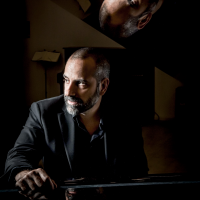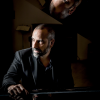Home » Jazz Musicians » Luca Dell'Anna
Luca Dell'Anna
Italian pianist and composer Luca Dell’Anna was born on October 10, 1975 in Ferrara, a historical city with strong ties to jazz. He grew up listening to his father’s extensive record collection including Count Basie, Ray Charles, Nat King Cole, Harry Belafonte and blues recordings together with Italian folk music.
His father also had a classical collection and Dell’Anna quickly fell in love with the music of J.S. Bach. Another important influence was Dell’Anna’s grandfather, who played the accordion and stressed the importance of tradition and melody.
The piano came into his life when he started playing a toy piano with friends at the age of six and discovered the world of improvisation. When he was in sixth grade, he was encouraged to take piano lessons, and this was the beginning of many years of education in classical music.
A new path opened that would eventually lead to his rebirth as a jazz musician. At 16, he started playing in funk-fusion bands that played the repertoire of Tower of Power, Chick Corea, Billy Cobham and other fusion heroes from his youth.
The discovery of jazz language resulted in Dell’Anna taking lessons with notable Italian pianist Bruno Cesselli and he would later attend “L’Università della Musica” in Rome under the tutelage of the great bop pianist Andrea Beneventano.
To this day, the teachings of Beneventano still provide the foundation of the lessons Dell’Anna gives to his own students.
At the heart of Dell’Anna’s sound lies a complex understanding of rhythm that goes beyond the generic sound of modern lyrical jazz piano. Part of the reason for this is his discovery of Cuban music and Latin rhythms: “I had very close friends who were big fans of Cuban music and I also started to listen to and learn proper Salsa music, in addition to Latin jazz: Chucho Valdes, Eddie Palmieri and my real big crush, Gonzalo Rubalcaba.”
In 1999, Dell’Anna moved to Milano to become a part of the vibrant music scene. He soon got in touch with the Cuban Latin jazz community and became a companion of great Cuban musicians such as Dany Martinez, who initiated him into the concepts and theories of Cuban and African music.
As a musician in demand, he played many gigs in various genres but started to focus on jazz and in 2005 he released the album “Brian Had a Little Plate” with Rootless Ensemble together with Simone Guiducci, Danilo Gallo, Francesco Bigoni, Massimiliano Sorrentini.
Read moreTags
Luca Dell'Anna Quartet: Human See, Human Do

by Neri Pollastri
Dopo due album in piano trio, il pianista ferrarese Luca Dell'Anna approda a una registrazione per quartetto e lo fa cambiando completamente l'organico della formazione e anche l'approccio alla musica. Il quartetto che interpreta questo Human See, Human Do è infatti composto da musicisti con i quali il pianista condivide principi artistici ed esperienze umane, tali da potergli permettere di affrontare la musica con grande libertà e condivisione, un'immediatezza alla quale alludono i titoli sia dell'album—ripreso da una battuta del ...
Continue ReadingLuca Dell'Anna: Mana

by Angelo Leonardi
Pianista eclettico e di ampie vedute, Luca Dell'Anna offre una sintesi tanto rigorosa quanto appassionante dei molti elementi--musicali e non-che hanno portato alla sua maturazione. Il nome del disco prende in prestito un termine caro all'antropologia culturale, usato dai popoli di Melanesia e Polinesia e ampiamente analizzato da Marcel Mauss e Claude Levi-Strauss. Tra i suoi significati c'è quello di forza soprannaturale che anima la realtà e lega tutte le cose in una superiore unità. ...
Continue Reading"[...] a brilliant artist, curious and versatile, as well as one of the most interesting realities emerged on the Italian jazz scene" (JAZZIT Magazine, #91, december 2015) "[...] Dell'Anna shows technical mastery and reflective depth: his lively rhythmic imprint always serves a sophisticated and imaginative eloquence” (A.Leonardi, www.allaboutjazz.com) "[...] Dell'Anna builds a piano trio able to move on different territories with agile security and takes advantage of this characteristic to look for - and, ultimately, find - a sign, energy, resilience, strength in the slow tempos, all dosed with measure and with a certain taste for contrasting flavors, the intention, that is, to always put an emphasis on what's not expected whether or not granted" (F.Ciminiera, www.jazzconvention.net)


























